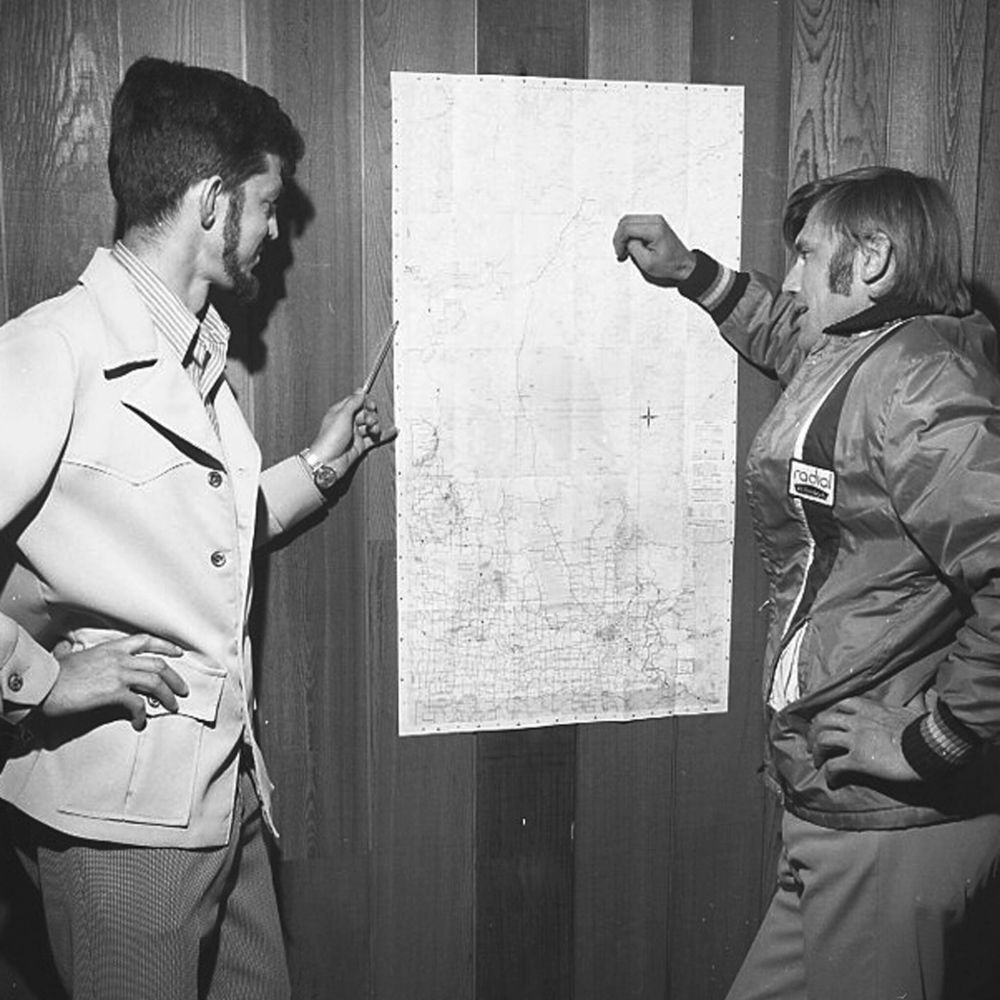CARILLON FLASHBACK: Sept. 19, 1973 – Steinbach pilots aid in search for downed plane near The Pas
Advertisement
Hey there, time traveller!
This article was published 06/05/2021 (1512 days ago), so information in it may no longer be current.
“We knew we’d be found sooner or later, but without food and wearing only light clothing, we were beginning to lose our strength. A few more days in really bad weather and it could have been curtains for us.”
Those were the words of Robert Froese, Steinbach pilot of a Piper Cherokee 235 that went down in The Pas area after navigational difficulties. Both the pilot and passenger Roger Barkman were found safe by Canadian Forces aircraft, after spending three nights and three days with the overturned plane, some 60 miles northwest of The Pas.
The two men had left Steinbach Wednesday on a flight to Flin Flon on a plane rented from Point West School of Aviation. Froese, a plumbing contractor with 2½ years’ flying experience, planned to check on a contract job in Flin Flon and his brother-in-law, a partner in Steinbach Hatchery, went along for the ride.

After checking on the work project, the two men left Flin Flon around 6:30 p.m. on the way to The Pas, where Froese planned to refuel, check the weather and submit a flight plan before proceeding further. They never reached The Pas.
They ran into severe turbulence, and heavy rain and strong winds. Froese said he did not have sufficient fuel for Winnipeg and was scared to fly through the weather without an automatic direction finder and accurate knowledge of their exact position.
Having lost ground reference and familiar landmarks, without radar to verify their position, Froese contacted The Pas airport at 7:22 p.m. to say he was having navigational difficulties.
Rather than making a forced landing in the dark and in bad weather, Froese decided to try and get the plane down in an area where search planes would most easily find them. He picked a swampy area near a lake and circled carefully several times before coming down as gently as possible.
The plane flipped over on its back upon impact, but neither the pilot nor the passenger was hurt, although they were poorly equipped for survival. Neither of the men had any food or liquids, and both were wearing light shirts and thin nylon jackets.
With the sun nearly down and the rain continuing, the men stayed in the airplane. With water in the main compartment, they had no choice but to crawl into the cramped area of the baggage compartment.
This compartment was their home until Friday morning and they never left the dry, but extremely cold and uncomfortable quarters, during that time.
They left the plane Friday morning and walked to higher ground. Greatly appreciative of the sunny weather, following the rain, they built a fire some 300 yards from the downed aircraft.
Both men felt reasonably sure they would be found, but realized that time was what counted and without proper clothing and food they couldn’t last very long if the weather turned bad.
“We conducted a 24-hour-a-day prayer meeting,” commented Barkman. They were confident that people back home would be doing what they could to find them. And they were right.
Seven planes and nearly 30 men left Steinbach Saturday morning, heading to The Pas, to assist the Canadian Air Forces in the search for the missing plane.
When they arrived, Steinbach pilot Johnny Barkman, who knew Froese well, suggested that because of weather conditions, Froese would probably have tried to set down before dark. That meant there was a good possibility the plane was west of The Pas, not to the east where the search was first conducted.
Five of the Steinbach planes, piloted by Harold Kihn, Johnny Barkman, A.D. Penner, Dave Fehr and Dr. John Choate, were assigned 12-mile blocks west of The Pas. The rest of the men accompanied Canadian Forces Search personnel as spotters.
Later Saturday afternoon, Canadian Armed Forces aircraft started searching west of The Pas and Major Bill Graham of CFB Winnipeg spotted the overturned plane on Windy Lake, Saskatchewan, approximately 60 miles northwest of The Pas.
“We heard planes in the distance several times,” said Barkman. “One plane . . . I believe it was the same one . . . made passes not too far from our position on Friday and Saturday, but this probably wasn’t a search plane.”
The plane that found the men was a single-engine Otter. It came right over the downed aircraft at around 4 p.m. Saturday. By the time the airplane made its second pass, both men had come out of the bush and were waving their jackets in the clearing.
The first airplane was joined within a short while by a second search craft, a twin Otter. Both circled for a half-hour, until a large search-and-rescue helicopter came and picked the men up and carried them to search headquarters at The Pas.
The rescued men received a big welcome at the airport from the Steinbach group and the rest of the search party at The Pas, and after a box lunch, were flown back to Steinbach, where they arrived shortly after 6 p.m. to be reunited with their families.
